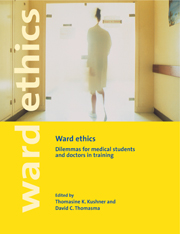Book contents
- Frontmatter
- Contents
- Acknowledgments
- List of contributors
- Prologue. Breaking the silence
- Letter from a young doctor
- Part I On caring for patients
- Section 1 Performing procedures
- Section 2 Problems in truth-telling
- Section 3 Setting boundaries
- Part II On becoming a “team player”: searching for esprit de corps and conflicts of socialization
- Section 5 Argot, jargon, and questionable humor: assuming the mantle at the patient's expense
- Section 6 Making waves: questioning authority and the status quo
- Section 7 Perceiving misconduct and whistle-blowing: observing peers or superiors commit an act deemed unethical
- Epilogue: Using this book
- Glossary
- Index
Section 1 - Performing procedures
Published online by Cambridge University Press: 05 February 2015
- Frontmatter
- Contents
- Acknowledgments
- List of contributors
- Prologue. Breaking the silence
- Letter from a young doctor
- Part I On caring for patients
- Section 1 Performing procedures
- Section 2 Problems in truth-telling
- Section 3 Setting boundaries
- Part II On becoming a “team player”: searching for esprit de corps and conflicts of socialization
- Section 5 Argot, jargon, and questionable humor: assuming the mantle at the patient's expense
- Section 6 Making waves: questioning authority and the status quo
- Section 7 Perceiving misconduct and whistle-blowing: observing peers or superiors commit an act deemed unethical
- Epilogue: Using this book
- Glossary
- Index
Summary
There comes a time when neophytes, in any field, must begin to practice the theory they have been taught. Coping with insecurity is a common response to the feeling that no one is available to clarify expectations and oversee performance. What distinguishes medicine from most other fields is that, despite intentions with the highest ideal of beneficence, the danger of harming the patient is an ever-present reality. Doctors, even beginning doctors, hold the lives of patients in their trust.
The cases in this section raise the following questions: What is the responsibility of trainees when directed by supervisors to perform procedures to which patients have not clearly consented? Does a patient have the “right to know” the trainee's inexperience? What constitutes benefit to the patient as opposed to benefit to the provider?
Also, confidence and trust are at the core of the special relationship between doctor and patient. Without the assurance that intensely private information learned from or about patients will remain private, physicians cannot expect patients to tell them the truth. However, there are limits to confidentiality. How should the responsibilities of respecting privacy and confidentiality be weighed against other countervailing principles?
- Type
- Chapter
- Information
- Ward EthicsDilemmas for Medical Students and Doctors in Training, pp. 17Publisher: Cambridge University PressPrint publication year: 2001



